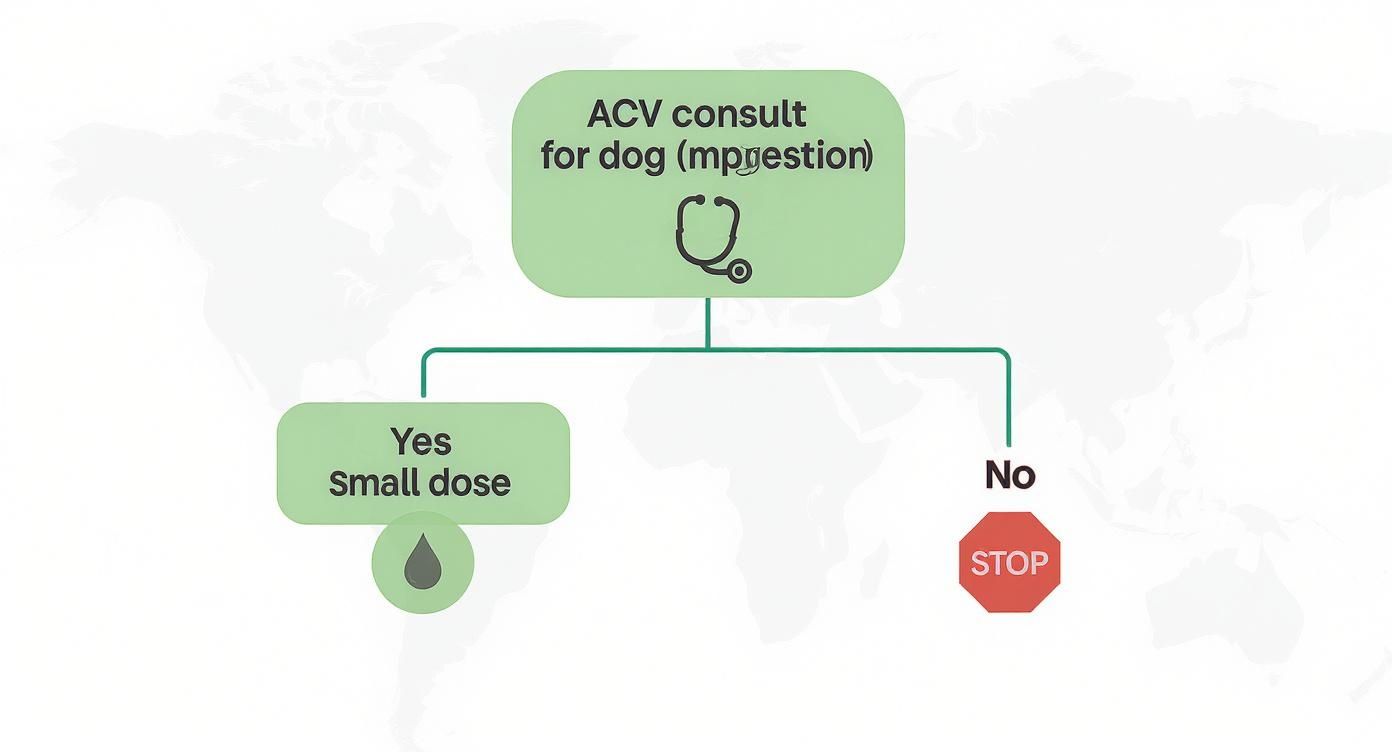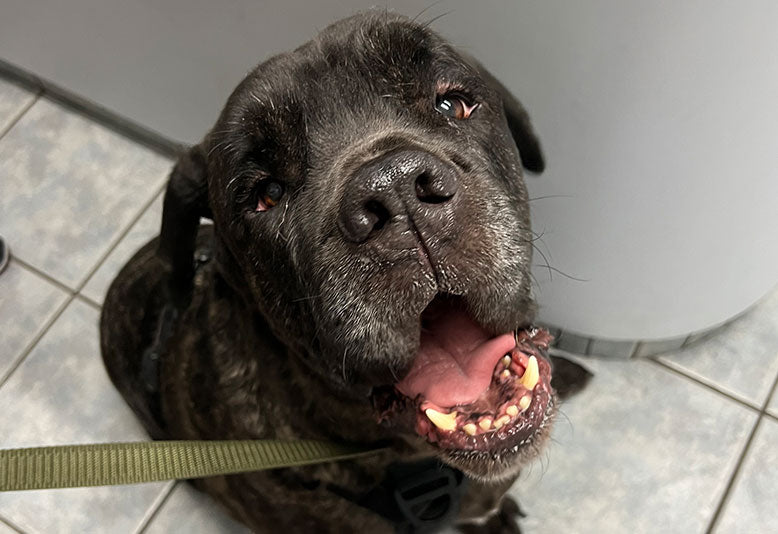
Apple Cider Vinegar for Dogs: A Guide to More Good Days
You’ve likely heard the buzz about apple cider vinegar (ACV) for dogs and are wondering if it’s a gentle, natural step for your best friend. We understand. When you're looking for ways to support their comfort, exploring every option is part of the journey. Let's walk through this together: while ACV is popular for things like skin rinses, it isn't a miracle cure. It must always be used with caution and heavily diluted.
The truth is, the science supporting its benefits for dogs is still catching up to the popular claims.
Is Apple Cider Vinegar a Good Idea for Your Dog?

We get why you're here. As a caring dog parent, you're seeking natural ways to support your dog’s health, and that path often leads to questions about pantry staples like apple cider vinegar. It seems simple and accessible, and you're not alone in thinking so.
Think of this guide as a conversation with a knowledgeable friend. We'll explore the popular claims and compare them with what veterinary science actually knows, helping you make a clear-headed, confident decision for your dog. Our goal is to gently separate what people hope ACV can do from what we can realistically expect.
Why Is Everyone Talking About It?
There's no doubt that interest in using apple cider vinegar as a supplement for dogs has grown. Online searches for the topic have jumped by a massive 140% in just the last few years. But it’s important to approach this trend with gentle skepticism.
A 2020 review highlighted a key point: there are no peer-reviewed clinical trials specifically on ACV for dogs. This means nearly every claim you read is based on personal stories or studies done on other species, not our canine companions. You can read more about these findings from Petfood Industry.
ACV for Dogs Claims vs Reality at a Glance
Here’s a quick summary of common beliefs about ACV for dogs against the current state of veterinary science.
| Common Claim | What the Science Says |
|---|---|
| Supports Flea & Tick Repellency | There is no scientific evidence to support this. External parasites are best managed with vet-approved options. |
| Supports Healthy Digestion | Some theories suggest it may aid digestion due to its acidity, but there are no dog-specific studies to confirm it. |
| Soothes Itchy Skin | A diluted ACV rinse might help with surface yeast or bacteria, but it can also cause irritation. It's not a solution for underlying allergies. |
| Promotes pH Balance | A dog's internal pH is tightly regulated. It's highly unlikely that dietary ACV would have a significant or beneficial impact. |
| Helps with Ear Infections | Never put ACV in an ear without a vet's diagnosis. It can cause severe pain and damage if the eardrum is ruptured. |
This table shows that while the intentions are good, the scientific backing for most popular uses just isn't there yet.
What We'll Cover Together
This guide is your resource for making an informed choice. We'll explore the most common uses for ACV and give you a balanced perspective, always putting your dog’s safety and comfort first.
- Understanding the Claims: We'll dig into the popular beliefs about ACV for skin, digestion, and more.
- Navigating the Reality: We'll discuss what we know, what we don't, and what's just wishful thinking.
- Prioritizing Safety: We'll give you clear, practical guidance on how to use it responsibly, if you and your vet decide it’s an appropriate option.
The small things we do for our dogs matter. Our promise is to give you the clarity you need to decide if ACV is a helpful step in your dog's journey toward more good days together.
Get Your FREE Dog Brain Health Guide

Get instant FREE access to today's top ways to help your best friend live a longer, healthier, happier life.
- 39 value-packed pages of expert insights
- Early-detection tips for cognitive decline
- Top brain-boosting superfoods
- Vet-approved mental sharpness strategies
- Fun IQ tests for your dog
What Exactly Is Apple Cider Vinegar?
You’ve probably heard dog owners talking about apple cider vinegar, but what makes it different from the plain white vinegar in your pantry? It all comes down to a natural journey from fresh fruit to a tangy, fermented liquid.
It all starts with crushed apples. First, yeast ferments the sweet apple juice, turning the sugars into alcohol. But that’s only the beginning. Next, a special group of bacteria called Acetobacter transforms that alcohol into acetic acid. This acid is the main component in ACV, giving it that signature sharp smell and sour taste.
The Importance of "The Mother"
Have you ever noticed cloudy, stringy stuff floating in a bottle of raw apple cider vinegar? That’s not a flaw—that’s the good stuff! It's called "the mother," and it's a living colony of beneficial bacteria, proteins, and enzymes that forms during fermentation.
Many believe this is where most of ACV's supportive properties are found. In contrast, the crystal-clear ACV you see on shelves has been filtered and pasteurized, a process which removes "the mother" and many of the beneficial components. This is why you'll almost always see experts recommend the raw, unfiltered, and unpasteurized version for any wellness use.
Think of it this way: "the mother" is the living heart of the vinegar. Choosing a bottle with it still inside means you're getting the most natural and complete version of the product.
This distinction is important when considering ACV for your dog, whether for a simple skin rinse or a small addition to their food. When you’re looking into natural options to support your dog's health, like searching for the best skin and coat supplement for dogs, knowing what makes a quality ingredient is always the first step. For ACV, "the mother" is a key indicator of quality.
Soothing Your Dog's Itchy Skin with ACV

It’s heartbreaking to watch your dog struggle with constant, maddening itchiness. You feel helpless and want to do anything to bring them some comfort. This is why so many dog parents look into using an apple cider vinegar rinse for itchy paws or hot spots.
The idea is that ACV's mild acidity can help make the skin's surface less friendly to common irritants like yeast and certain bacteria. Think of it as gently rebalancing the environment. But this is a remedy that requires a gentle touch and a watchful eye.
Creating a Safe Topical Rinse
If you and your vet agree an ACV rinse is worth a try, the most important step is mixing it correctly to protect your dog’s skin. A mixture that's too strong will sting and could make the irritation worse.
The recommended recipe is a simple 50/50 solution.
- Step 1: In a clean spray bottle, combine one part raw, unfiltered apple cider vinegar with one part cool, purified water.
- Step 2: Shake the bottle well to combine. Be sure to shake it again before each use.
- Step 3: Always do a patch test first. Spray a tiny, non-irritated spot on your dog’s skin and wait a few hours, watching for any redness or signs of discomfort.
Your dog's comfort is everything. If they yelp, pull away, or the skin looks worse after the test, stop immediately. This isn't the right solution for them, and that's okay.
How to Apply It and What to Keep in Mind
Applying the rinse correctly is just as important as mixing it properly. For a specific spot, like a yeasty paw, you can lightly mist the area once or twice a day. For sensitive areas near the face, it’s much safer to dab the solution on with a cotton ball to keep it out of their eyes and nose.
It's important to remember that a topical rinse is like a bandage—it can offer temporary relief but doesn't address the root cause. Most skin issues are signs of a deeper issue, like allergies, which often need a more comprehensive plan. Supporting skin health from the inside is a huge piece of the puzzle. Many families find success by adding omega-3s to their dog's diet; you can learn more about using fish oil for dog allergies in our guide.
What Does the Research Say?
You'll find countless personal stories about ACV online, but the scientific evidence for its effect on skin is mixed. A 2019 survey found that over 45% of people had tried it as a topical treatment for their pets.
However, another study showed that a 50/50 vinegar-water mix didn't improve dermatitis any better than a placebo. More importantly, a report from the AVMA noted that 12% of dogs treated with undiluted ACV had skin irritation, which reinforces how vital proper dilution is. You can read more about these findings at The Canine Dietitian.
Ultimately, an ACV rinse is a surface-level tool for temporary comfort. Your best path forward is always to work with your veterinarian to discover what's truly causing your dog’s itchiness and get them on a journey to long-term relief.
How ACV Might Support Your Dog's Digestion
A happy gut often means a happy dog, and as their person, we're always looking for natural ways to maintain their comfort. When it comes to apple cider vinegar, its potential role in digestion is a common topic among pet parents.
The interest comes from a couple of key ideas. First, since ACV is fermented, it contains prebiotics—the compounds that help nourish the good bacteria already in your dog's gut. The thought is that by supporting these beneficial microbes, ACV could help maintain a balanced and healthy gut environment.
The other theory is that its natural acidity might assist with breaking down food, especially proteins. While these concepts sound promising, it's important to know they're mostly based on human experiences and general knowledge, not on scientific studies done specifically with dogs.
A Closer Look at the Claims
When you look for the research, the evidence for ACV as a digestive aid for dogs is mostly theoretical. For instance, some suggest ACV could increase stomach acidity to help with protein digestion, but this idea is borrowed from human and other animal studies—it hasn't been shown in controlled canine trials.
Similarly, other benefits seen in different species, like lower cholesterol, haven't been shown to carry over to dogs. You can find more great insights on this topic from Healthy Pawsibilities. This lack of direct evidence is why talking to your veterinarian is so important.
Every dog's system is unique. What works for one might not be right for another. Starting any new supplement, even a natural one like ACV, is a decision you should always make together with your trusted vet.
A Gentle and Cautious Approach
If you and your vet decide to give apple cider vinegar a try, the guiding principle is "less is more." This isn't a case where a bigger dose is better. In fact, giving too much can easily cause an upset stomach, vomiting, or other digestive issues.
The goal is to introduce a tiny, highly diluted amount and see how your dog's system responds.
- Start Small: Begin with just a few drops mixed into their food or a large bowl of water—not a full dose.
- Observe Closely: Pay careful attention to any changes in their appetite, stool quality, or overall comfort level.
- Stay Consistent: If you don't see any negative signs, you can maintain this tiny amount, but resist the urge to increase it quickly.
This slow, observant method lets you safely gauge your dog’s individual tolerance. For more guidance on supporting your dog’s health from the inside out, check out our resources on nutrition and supplements. It's all about making small, thoughtful changes that lead to more good days together.

Support Your Dog's Brain Health with NeuroChew™
As mentioned in this article, NeuroChew is the first dog chew designed to support both cognitive function and healthy circulation. Perfect for dogs showing early signs of cognitive decline or for proactive brain health support.
Preparing ACV for Your Dog Safely
So, you've spoken with your vet and decided to give apple cider vinegar a try. That’s a thoughtful first step! Now, let’s talk about how to do it safely and correctly, because proper preparation is everything.
The most important rule is to never give your dog undiluted ACV. It’s far too acidic on its own and can be harsh on their teeth, throat, and stomach. Always think of it as a concentrate that needs to be watered down to become a gentle addition to their routine.
This chart helps map out the process after you’ve gotten the green light from your vet.

As you can see, the plan is simple: talk to your vet first, then start with a tiny amount and watch how your dog responds.
Choosing the Right Kind of ACV
When you’re in the grocery aisle, you’ll likely see a few different options. The one you want for your dog is always raw, organic, and unfiltered, with "the mother" still inside.
Those little cloudy bits floating around? That's "the mother," and it's a good thing! It’s a mix of beneficial bacteria and enzymes created during fermentation, and it’s where most of the supportive properties are thought to be. The clear, filtered kind has had all that goodness stripped away.
How to Introduce ACV into Their Diet
There are two easy, gentle ways to add diluted ACV to your dog's routine. The key is to make it a normal part of their day.
-
In their water bowl: This is a popular choice. Just add the correct dose to a big bowl of fresh water. A helpful tip: always have a second bowl of plain, fresh water available. Some dogs don't care for the new taste, and you never want to discourage them from staying hydrated.
-
Mixed into their food: This is often the easiest method. The taste gets hidden in their meal, especially with wet or fresh food. Just stir the diluted ACV right in.
A gentle reminder: Every dog is different. Keep a close eye out for any changes, like an upset tummy or loss of appetite. If you notice anything that seems off, it's best to pause the ACV and check in with your vet.
Suggested Starting ACV Dilution Guide by Dog Weight
This table provides a safe starting point for diluting ACV in your dog’s daily water. We always recommend starting with even a little less than what’s suggested here just to be extra cautious. Remember, this journey is about gentle progress. Always consult your vet before starting any new supplement.
| Dog Weight | Suggested Daily Amount of ACV | Amount of Water to Dilute In |
|---|---|---|
| Up to 15 lbs | ¼ teaspoon | At least 1 cup |
| 16 to 35 lbs | 1 teaspoon | At least 2 cups |
| 36 to 85 lbs | 1 tablespoon | At least 4 cups |
This slow-and-steady approach is the best way to gently support your best friend.
As our dogs get older, their needs change, and it’s wonderful that you’re exploring different ways to maintain their comfort. For more ideas on supporting your gray-muzzled companion, our guide on supplements for older dogs has a lot of helpful information. Ultimately, working closely with your vet is the most powerful tool you have.

Real Results: How NeuroChew Helped Brutus Regain His Mental Clarity
Brutus was getting disoriented at night. After starting NeuroChew, he's more happy during the day and steady at night. He's back to his old self!
When You Should Avoid Using ACV
Knowing when not to use something is often more important than knowing when to use it, especially on this journey with your dog. While apple cider vinegar can be a helpful tool for some, it's definitely not the right choice for every dog.
Think of this as a starting point for a conversation with your veterinarian. They know your dog's full health history and can help you decide if ACV is a good idea or something to skip. For some dogs, adding ACV can create more problems than it solves.
Health Conditions That Don't Mix With ACV
Certain health conditions can make apple cider vinegar a risky supplement. Even when properly diluted, its acidic nature can be too much for a system that's already sensitive or compromised.
Here are a few specific situations where you'll want to avoid giving your dog ACV:
-
Dogs with Kidney Issues: Healthy kidneys are masters at filtering waste and keeping the body's pH level balanced. If your dog has kidney challenges, their ability to process the extra acid from ACV is reduced, which could throw their delicate internal system out of balance.
-
Dogs with a History of Bladder Stones: Some types of bladder stones, particularly calcium oxalate stones, tend to form in acidic urine. Since ACV makes urine more acidic, giving it to a dog prone to these stones could accidentally create an environment where more stones can develop.
-
Dogs with Sensitive Stomachs: Does your dog already struggle with an upset stomach, vomiting, or general digestive sensitivity? The acidity in ACV can easily irritate their gut lining and make those issues worse.
We know you're looking for the best ways to care for your dog. Sometimes, the most loving decision is to recognize that a popular remedy isn't the right fit for your individual companion. Your vet is always your best resource for making these calls.
It's similar to how we might research specific herbs for certain issues, like wondering if dogs can have Ashwagandha for anxiety. It’s just as crucial to know what to avoid. Always put your dog's unique health needs first.
Still Have Questions About ACV for Dogs?
It's completely normal to have a few more questions. After all, when it comes to our dogs' health, we want to feel confident in our choices. Let's tackle some of the most common things people ask about using apple cider vinegar.
Can Apple Cider Vinegar Help My Dog's Tear Stains?
This is a popular home remedy for those reddish-brown stains. The theory is that a little ACV in your dog's water can change their body's pH, making it less friendly to the yeast that can cause the discoloration.
The honest answer? It's a maybe, at best. There's no real scientific backing for this, and success stories are purely anecdotal. What's most important is that you never apply ACV directly to your dog's face or near their eyes—it would be incredibly painful. The best first step for persistent tear stains is always a chat with your vet to check for underlying issues like allergies or blocked tear ducts.
Does ACV Really Help with Fleas and Ticks?
We all wish there was a simple, natural solution for these pests, but ACV isn't it. While its strong scent might be a temporary deterrent, there is no scientific evidence that it effectively repels or harms fleas and ticks in a meaningful way.
Relying on apple cider vinegar for parasite control can leave your dog exposed to fleas, ticks, and the serious diseases they can carry. It's best to stick with a vet-approved option that's known to be safe and effective.
Is It Okay to Give My Dog ACV Every Day?
As long as your vet is on board and your dog handles it well, giving a very small, highly diluted amount of ACV daily is generally fine. The key here is consistency and careful observation.
Keep an eye out for any signs of an upset stomach or skin issues. And a helpful tip: always have a separate bowl of plain, fresh water available so your dog has a choice. Every dog is different, so what works perfectly for one might need a little adjustment for another.
For a science-backed way to support your dog's health from within, check out Furever Active. Our NeuroChew™ supplement is formulated to promote brain health and mental clarity, helping you and your best friend make the most of your days together. Explore how we can support your dog's journey here.
Share This Article

Support Your Dog's Brain Health with NeuroChew™
The first dog chew that supports both brain function and healthy circulation. Perfect for dogs of all ages.
- Enhances cognitive function & mental clarity
- Reduces anxiety without sedation
- Supports healthy blood circulation
- Made in USA with natural ingredients
60-Day Money-Back Guarantee • Free Shipping







